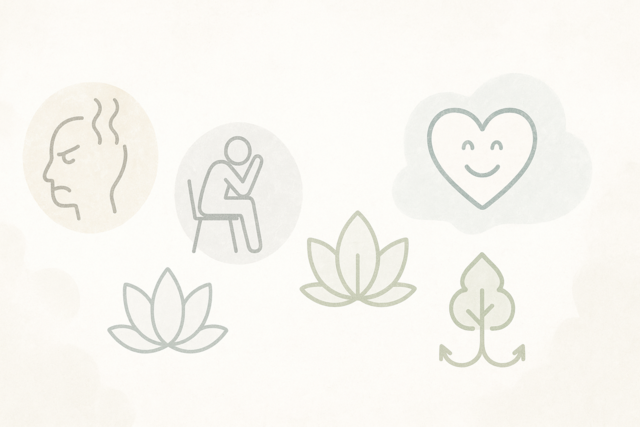Small Change and Large Rewards
When our bodies and minds are constantly being bombarded with activities or "to do lists", we feel overworked and our efficiency suffers. When we are in these situations, we need to re-evaluate our activities and make sure that we understand our priorities. Sometimes, simplifying our lives and cutting back on unnecessary obligations is necessary, so that we can focus on the things most important to us. By spending more time in areas of our lives that we are interested in, we can reduce time pressure and find time to relax and enjoy life.
Unfortunately, we spend so much time doing things for others, or trying to please others either at work or in our personal life, that we forget that we need some time for ourselves as well. When we try to free ourselves from some of these activities, we often feel a sense of guilt or neglect. Our self-talk constantly reminds us of this.
The small change we talk about in this section is the need for you to give yourself permission to relax and do the things that are most important to you.
Here are some things you can do before you try out this small change:
-
-
Identify the things in your life you want to do or want to get away from doing.
-
Think of what is holding you back from doing or not doing these things.
-
Talk it over with the people in your life--those who will be affected by your decision--and ask for their help and support to put your plan in place.
-
If the decision is yours alone, then give yourself the break you need and the permission you need to make the change or changes.
-
Once you have made the change or changes, evaluate your decision regularly to make that there are improvements to your stress levels and your life.
-
For example: an entrepreneur was stressed out about the paperwork she had to do for two small businesses she runs each evening after returning from work. Her weekends were tied up with the chaos of house repairs, lawn mowing, etc. She was desperate to have some time to herself to do what was important to her � like relaxing, reading or simply watching television.
After a lot of soul-searching, she decided to stop working so hard and give herself the break she needed. However, she was feeling really guilty that the paperwork was piling up. So she talked to a friend about it and was advised to simply find a bookkeeper to help her with the paperwork. This would provide the free time she much needed and also tidy her accounts for the accountant at year-end. This is exactly what she did. After doing so, her feeling of stress greatly diminished.
Don't be hard on Yourself
We see stress in people everyday--people who feel that external stressors like deadlines, demands for excellence from management, or the corporate culture in which they work--all put top-quality, smart people under tremendous stress.
Although many think that their stress is external, in many cases, this pressure is internal and is created by:
Most people are just too hard on themselves. What they need to do is:
-
Take a realistic approach to work and not be afraid to negotiate tight deadlines with management.
-
Encourage open communication and solicit feedback from management to make sure their performance is consistent and that there are no surprises when they go in for review at year-end.
-
Push back on any peer pressure to work lunch breaks, evenings and weekends � organize and be as productive as possible during the work day.
It is amazing to see a change in attitude when managers realize that their perception was in many cases a reality and that:
-
They can be less than perfect and still produce good work.
-
Negotiate and set more realistic deadlines to take a lot of pressure off themselves and the people who work for them.
-
Prioritize work to find out what needs to be done first and what can be left for another day.
-
Monitor their self-talk to ensure they are not stressed by their own negative thoughts such as, bad appraisals or being fired.
-
Start countering negative thoughts with positive thoughts that they are in control of things they can accomplish.Want to learn more? Take an online course in Stress Management.
Take a look at your lifestyle, work schedule and family life and see what changes you can make by following some of the advice in this section. Reduce some of the stress you may be feeling because of internal causes which you have control over.
Physical
Getting the sleep you need is vitally important to your health and for managing stress. An average adult should get at least 7-8 hours of sleep per night. Our current lifestyles rob us of our sleep and we spend valuable hours which should be spent on sleep working, watching TV or going out on the town.
Sleep deprivation affects a person's mood, often times making them depressed and irritable. When sleep deprivation is coupled with stressful situations it can double the stress we experience.
Make sleep an important part of your lifestyle and your stress management strategy. Beat the urge to watch one last TV program and go to bed sufficiently early, so you won't need an alarm clock to wake you up. Waking up naturally means your body has gotten the sleep it requires and this should leave you energized.
People with stress-related problems often tend to gain weight as they either eat out or grab some fast food. Furthermore, when we are stressed we often indulge in eating comfort food, drinking alcohol or smoking as a coping strategy. While stress causes ill health, our coping strategies to stress further increases our risks of ill health.
Therefore, changing to a healthy lifestyle is an important part of coping with stress. Here are some things you can do to improve your lifestyle.
-
Eat meals at regular times.
-
Have a balanced and healthy diet � most fast food restaurants now provide a healthy choice menu.
-
Take a vitamin supplement if you feel you are not getting all the daily nutrients your body needs.
-
Exercise regularly or include recreational activities in your daily routine.
-
Take time to rest, relax and nap. Warm baths, scented candles and massages can greatly reduce your stress.
-
Explore Yoga, Meditation, and other relaxation techniques.
Here are things you should avoid:
-
Avoid consumption of alcohol, caffeine and drugs.
-
Avoid over-eating, eating junk food and comfort food. Settle for a healthy snack like fruits or vegetables.
It appears that the very lifestyle choices we make to try and relieve stress are destructive to us. You should examine your coping strategies and note if they are good or bad for your physical well being. Make a list of the healthy strategies you should follow. The next time you are stressed, make sure they are the one's you are using to cope.
Build Positive Relationships -
Build positive relationships with friends and family so that in times of emotional stress you can have someone to talk to and listen. Talking helps relieve stress and can help find alternate solutions to problems.
Build networks of contacts you can depend on and who will help you find a job, recommend a babysitter, a yoga instructor or a great book on stress management. Social Networking is becoming extremely popular worldwide with facebook.com growing by a staggering 270 percent since its inception.
Setup contacts with coaches, mentors or support groups. People who have had the same experience as you can provide you with advice and emotional support to reduce your stress. For example, don't be afraid to seek counseling for specific situations. Seek a career counselor if you find yourself recently unemployed.
Stress can bring down your self-esteem and it is very important that you build it up so you can counter stress. The first rule in building self-esteem is to never compare yourself to others and the second is to never put yourself down. The following website provides you with twelve steps to build your self-esteem � use it as part of your stress management strategy.
http://hypnotherapy.net/12se.shtml
Don't wait until you need a shoulder to cry on to start building your social network. It is always good to have a social support system both in good times and bad. One of the best ways of building such a system is to help others in their time of need. Call or visit someone who is unwell or going through a crisis.
Laughter and Play �
Spend your time enjoying yourself and relaxing with friends. Laughter, after all, is the best medicine and engaging in any sort of physical activity will lift your spirit. Finally, interacting with friends will help liven up your mood and allow you to forget your worries and stress.
How often in times of stress do we think, what is our real purpose in life?Why do we exist? Sometimes life may seem quite meaningless when we are stressed. Yet, if we understand that we are very special and that we can build our lives on a sound foundation, we can cope with whatever is thrown at us.
Religion can be one of the sound foundations we can anchor our lives to. Religion provides inspiration, an avenue for prayer and meditation and a sense of security that we are not alone in the world. It inspires us to prioritize the important things in life and gives us the strength to believe that whatever happens to us will soon pass rather than stay with us forever.
Furthermore, if you are part of a religious community, you can find the support and help you need in times of stress or enhance your spiritual energy by sharing spiritual experiences with others.
For almost 20 years, Dr. James W. Pennebaker, a research psychologist, has been asking people to write about their feelings when faced with emotional distress in their lives. This simple process has helped strengthen immune systems and in some cases, completely changed lives.
Inspire yourself to put down your innermost thoughts on paper when you are faced with a stressful situation. Spend some time each day--10-15 minutes--to keep a diary or journal of your thoughts to help reduce your stress.
Have a day of rest and renewal for yourself. It could be a day of rest where you do something that gives you pleasure and where you don't have to think of life's stressors. You can read, sit in the sunshine, listen to inspirational music, or watch a movie. Just give yourself the permission to do whatever you want � it is guaranteed to inspire you and build spiritual energy.






























